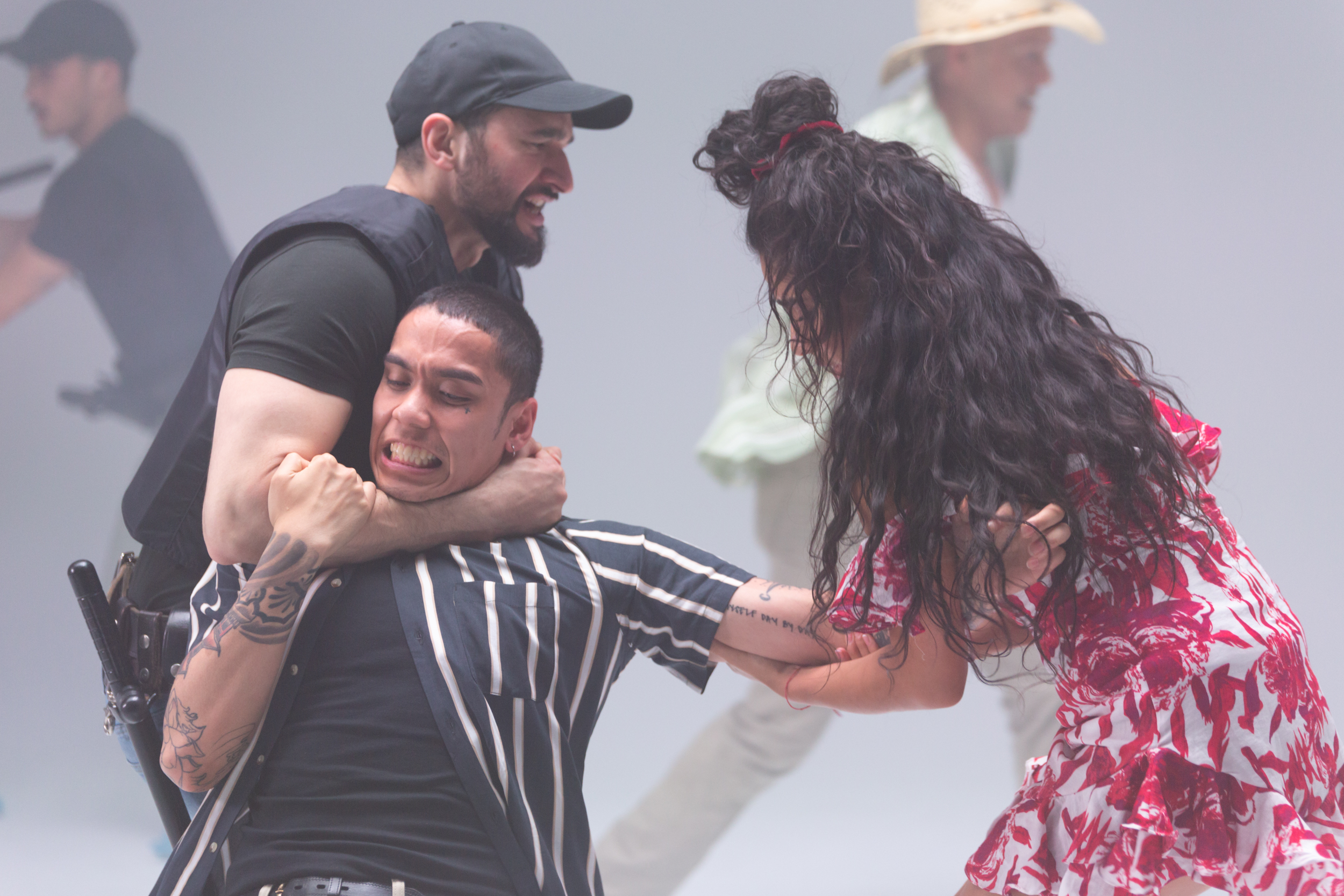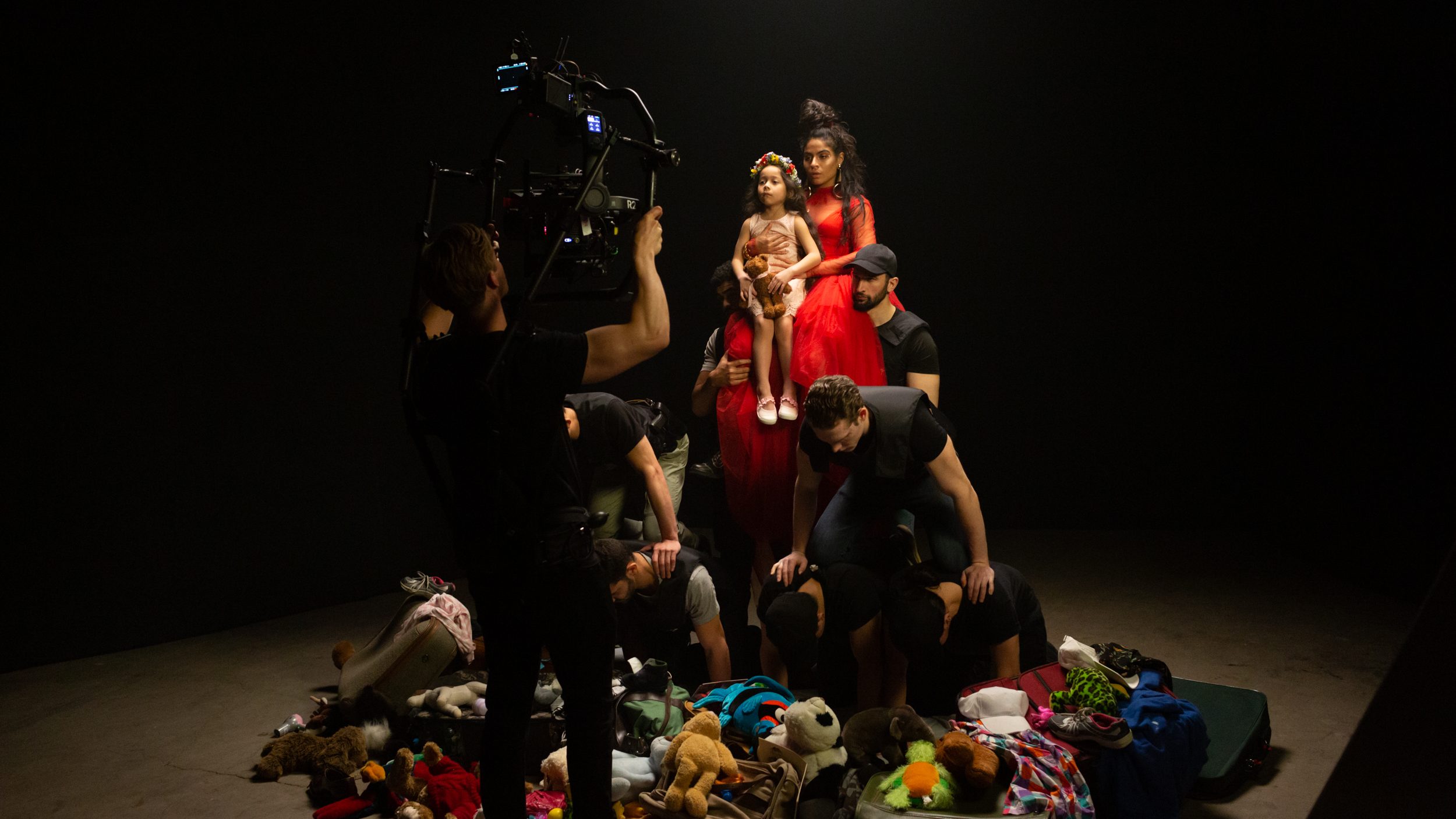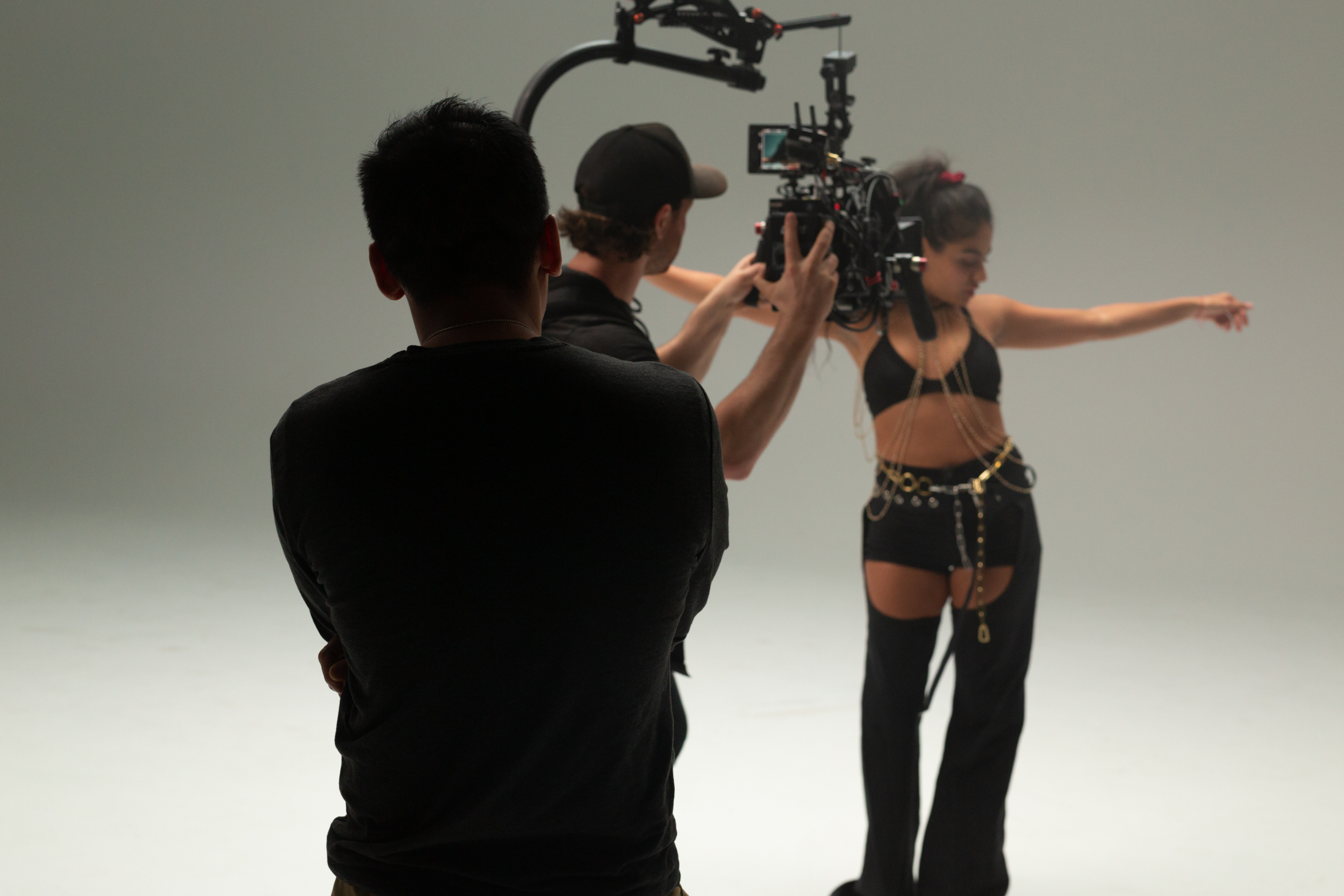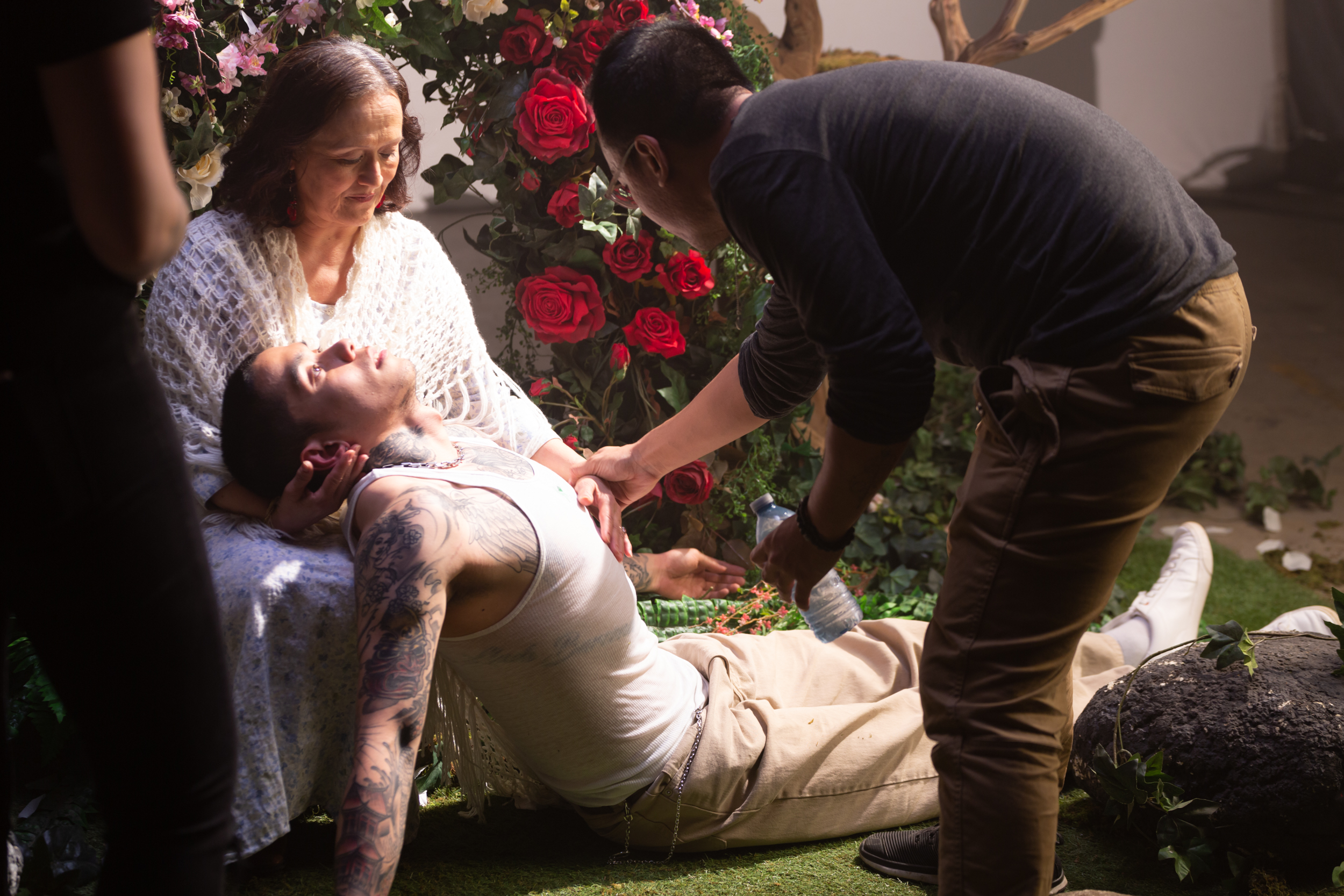The video ‘Far Away,’ for which you won the Prism Prize, looks at the human impact of xenophobia through a stylized lens. How did you come up with the concept for it?
My original treatment was really different; it was a stylized performance video. Jessie came back and asked if there was a way to make it about immigration, and I just ran with it from there.
The original performance video idea became this launching point on how Latinx stereotypes in American media (gangsters, drug dealers, tattooed MS-13) inform prejudices, and how that then informs policy. I was really inspired by this conversation I had in Salt Lake City, Utah; my Uber driver was talking to me about movies and how he liked the Mark Wahlberg film about the Boston marathon bombings. He liked how it felt real and showed “how much they hate us.” And when I asked who “they” were, he hesitantly said, “you know… uh… Muslims.”
That was a big light bulb for me. I hadn’t seen a single Muslim in all of Utah, and I’m guessing this driver hadn’t had very many experiences himself. It proved to me that what people watch for entertainment 100% informs their worldview, especially if they’re tucked away in their own bubbles. Around that time I had also watched Sicario: Day of the Soldado, which is a perfect example of irresponsible, ignorant work that helps prop up Trump’s xenophobic policies.
All that, in a nutshell, was the gestation for the video and informed the first three or four scenes. The rest of it came from using the structure of the song to expand on the narrative and then stage it in a way that felt like a series of paintings, like you would see in a church.

You talk a lot about how important it is for Canada to support the music video art form, and how that funding gave you your start. What is it about music video in particular that makes it so important to support?
Music videos are a wonderful place to learn craft, try out new techniques, and practice the art of filmmaking. As a director, there is almost no way to learn other than doing it. And the mistakes you make on a music video won’t kill your career the same way a mistake on a feature film would. A ton of top directors got started with music videos: David Fincher, Spike Jonze, Michel Gondry. I think their early features are incredibly accomplished technically because of their experience.
Beyond that, videos are a very pure art form that are consumed en masse (look at the YouTube numbers). There’s a ton of freedom to experiment, and sometimes it feels like you can literally do anything, so long as the artist/label trust you to do it. Honestly, if Picasso or Dali were alive and working today, I guarantee you they’d be doing music videos. They are such an important part of culture and reflect the collective psyche of the world; from just an aesthetic point of view (style, fashion, photography) or from a more humanitarian perspective (political, documentary). I think their importance is really quite clear and undeniable.
Unfortunately, Canada’s market share means that Canadian music video budgets are low. Which would be less of a problem if the directors could transition into advertising like they do in the rest of the world, but they can’t. I don’t know what it is exactly but Europe and the US take music videos seriously; directors are discovered, nurtured and grown by production companies through the art form. They get to make a living off of commercial campaigns and can then start working internationally. There’s a respect for it. Here in Canada, music video directors tend to be treated like the skills we have don’t apply to any other form of filmmaking. I’ve found the industry in the UK and LA to be much more receptive, which is a story I hear repeatedly from musicians and directors alike. Canadian music video directors have to make it in the US before they’re taken seriously here. That’s not to say I didn’t get support here in Canada, but the people who supported the most tended to be outsiders themselves (shout out Rey and Mauricio at Mad Ruk).

In an Interview with the New Yorker, you called your short “5 Films about Technology” an “anthropological piece” that explores how our smartphones “re-create an emotional experience from another person.” The feature you co-produced, Code 8 is set in a future dystopia where technology has fully integrated with humanity. What is it about technology that makes it such a central theme to your work?
I find technology fascinating because it only makes the traits of what makes us human more intense. From a dramatic standpoint, there’s a lot to explore about what it means to be human: love, jealousy, validation, the need for vengeance, everything.
Even though we created it, technology always seems to spiral out of control and get ahead of us. Nobody could have guessed social media had the ability to be weaponized. But it has. And already, intelligence agencies are warning about how we’re not ready for the impending wave of “deepfakes:” videos that appear real but are manufactured with machine learning. Considering most people seem to be getting their information and news from social media, I think we need to start becoming much savvier to what we’re watching. We’re currently living in an age where video footage equals truth (which is already a poor assumption), but that is going to change very quickly. Beyond the obvious political implications, there are more frightening personal ones where people can try to settle personal vendettas through smear campaigns supported by fake videos.
That said, it’s not all negative! When I was a kid, I would never see my Chinese grandparents. It was impossible to visit, and calling them was expensive. Now I can video call them once a week. So I’m not anti-technology; technology is just a thing. We humans are responsible for the morality of it. Like they say, the best sci-fi films aren’t about the sci-fi, it’s about how sci-fi reveals what it means to be human.
When you were growing up, it seems as if a career in the arts wasn’t something you had on your radar. I’m sure there are a lot of young Canadians in the same situation right now. If you could speak to yourself back when you were making the decision to follow your passion towards animation, what advice would you give yourself?
I don’t really regret anything with respect to choosing one thing over the other… I do wish I took a more serious stab at music. I played a lot of music as a kid and loved it. But film was still a passion. Though I will say, I wish I took more chances and failed more when I was younger.
Which leads me to my advice to young Canadians who are thinking about art: go do it, fail faster, and work really, really hard. Discipline yourself. Read the book ‘Slight Edge’ by Jeff Olson. It’s going to be difficult and it’ll take a lot of sacrifice, but the one thing that I see in common with everyone who made it in film and music is they didn’t give up. It sounds cheesy, but it’s true. What people don’t realize about the ‘don’t give up’ advice is that it’s not about one year, it’s about 10 years, maybe 15 of working really hard. And don’t forget to live your life as well… go live out your own stories so you have experience to draw on for your work.
And if there is anything else you could see yourself doing, like cabinetry… go do that instead.

You have a resume full of multiple music videos for two notable Canadian artists, Jessie Reyez and SonReal. What is the benefit of repeat collaboration?
Familiarity and trust; there’s a shorthand. New artist relationships can also be rife with apprehension and fear… bold ideas can scare people away. ‘Far Away’ would not have been possible with another artist. I find these more abstract pitches don’t land. And if you’re pitching with an artist for the first time, they’re likely reading a dozen other treatments so… it’s less than ideal. It’s also beneficial to be able to call either of them up and just explain the idea. SonReal’s ‘For the Town’ needed to be pitched verbally because I knew the written version was hard to visualize.
I’ve heard Hiro Murai say something similar in an interview on his collaboration with Childish Gambino. So there you have it. Straight from the best… in my opinion at least!
On set photography courtesy of Phil Harris




